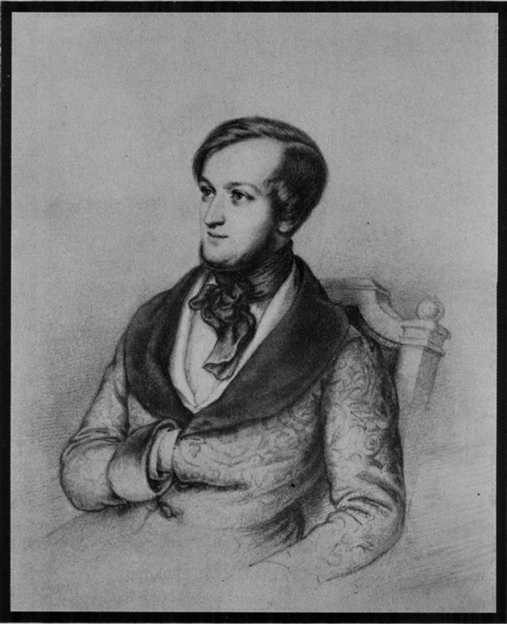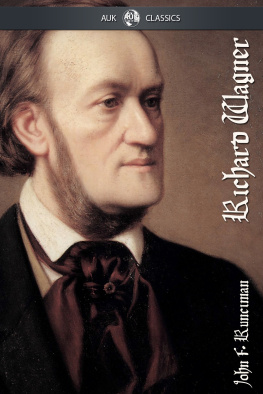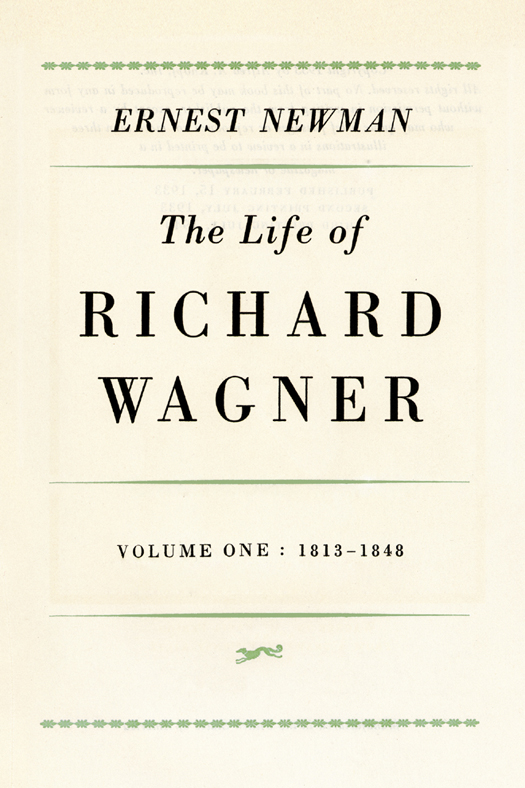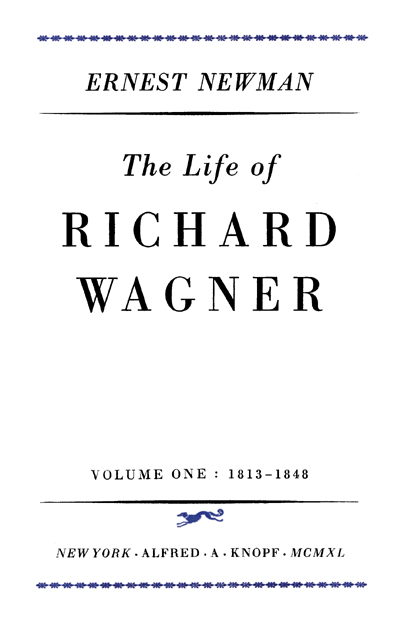
W AGNER IN THE P ARIS P ERIOD
FROM A DRAWING BY ERNST KIETZ
()
Copyright 1933 by Alfred A. Knopf, Inc.
All rights reserved. No part of this book may be reproduced in any form without permission in writing from the publisher, except by a reviewer who may quote brief passages or reproduce not more than three illustrations in a review to be printed in a magazine or newspaper.
PUBLISHED FEBRUARY 15, 1933
SECOND PRINTING JULY , 1933
THIRD PRINTING JULY , 1940
eISBN: 978-0-8041-5046-0
v3.1
TO
VERA
FOREWORD
A NOTHER LIFE of Wagner may seem to many people a superfluity at this time of day. My justification for the present attempt is that as yet no satisfactory Life of him exists, for one reason, among others, that during the last twenty years or so, and still more during the last ten or even the last five years, so much new and vital first-hand matter has come to light that ones old conception of the story has had to be modified at a hundred points. The life of no artist indeed, of very few men in any walk of life is so copiously documented as that of Wagner. He himself has left us, in addition to the Autobiographical Sketch of 1843 and the Communication to my Friends of 1851, an autobiography running to nearly 900 pages, though it covers only the first fifty-one of the seventy years of his life. He was one of the most indefatigable of letter-writers, and every few years sees an addition to the published number of these. When Wilhelm Altmann, in 1905, brought out what was intended to be the definitive edition (in the form of abstracts) of Wagners letters, he had at his disposal 3,143 of these. When, nine years later, Julius Kapp and Emerich Kastner embarked upon yet another complete edition, the number of available documents had increased to 5,000. Since that time there have appeared the volumes of letters to Frau Julie Ritter (1920), to Hans Richter (1924), to Albert Niemann (1924), and to Mathilde Maier (1930), as well as a number of isolated letters in various periodicals. In addition we have had, during the last few years, the second volume of Sebastian Rckls Ludwig II und Richard Wagner, with its new documents relating to the Munich epoch; Du Moulin Eckarts Cosima Wagner, again with a mass of first-hand material relating to this and the later period; Woldemar Lipperts Richard Wagners Verbannung und Rckkehr, 18491862, with a large number of new letters and of other documents relating to those years; the Richard Wagner und seine erste Elisabeth of Julius Kapp and Hans Jachmann, containing much material that had hitherto been unpublished; several new letters in Frau Elisabeth Frster-Nietzsches Wagner und Nietzsche zur Zeit ihrer Freundschaft; and the many still unpublished letters the contents of which are summarised in the Catalogue of the Burrell Collection. In further addition to all this there has been published, in one book or another on other subjects, a mass of new material bearing directly or indirectly on Wagner; while the intensive research of the Munich and other archives is constantly adding to our first-hand knowledge of the personalities and the events of this or that period of the story. Furthermore, while most of the older editions of the Wagner letters were subjected to plentiful deletions, the gaps thus made in our knowledge of the full facts of the case are gradually being filled in: Mr. Elbert Lenrow, for instance, has not only given us, for the first time, the authentic text of the letters to Pusinelli that appeared, under the aegis of Wahnfried, in 1909 in the Briefe an Freunde und Zeitgenossen, but has published in full a number of letters from Wagner to Pusinelli that were omitted from that book, as well as several from Pusinelli to Wagner.
When Nietzsche said that most of what passed for Wagner biography was fable convenue, or worse, he spoke more wisely than he knew. It is not so much that the existing records were tampered with by partisans though there has been a fair amount of that as that events were narrated and conclusions come to on the basis of records that were lamentably imperfect. Everybody who has attempted original research in the field of biography will agree sadly with Walpoles refusal to let his son read some history to him: Not history! said the shrewd old man; that is sure to be false! His experience at the centre of politics for so many years had shown him how little the facts, as the world at large knew them, or thought it knew them, corresponded with the facts as known to those who had taken an active part in the events. In the vast majority of cases we know far too little of the personalities, the outer and inner lives, and the environment of musicians to be within a measurable distance of compiling authentic biographies of them. As a rule we have records, such as they are, of only one side of the case. Even a mans letters, though they may have survived by the thousand, are at the best only the equivalent of our listening to one end of a telephone conversation.
The rule that no man is to be accepted as judge in his own cause, and, indeed, not always as the advocate in it, is blandly forgotten by musical biographers. Flauberts Bouvard and Pcuchet, in the course of their pathetically vain itinerary through all the arts and sciences, came to the same rational conclusion as Walpole that what passes for history and biography is largely legend, fiction, or guesswork. They had innocently planned a life of the Duc dAngoulme; but their comic inability to find out, within the narrow circle of their own household, who had drunk the Calvados, how the chest got broken, what Madame Castillon wanted when she was calling Gorju, and whether he had dishonoured Mlie, led them to the sage if sad reflection, We are not able to tell what is happening in our own household, yet we lay claim to discover all about the hair and the love affairs of the Duc dAngoulme!
They had the sense to see, what no musical biographer, with an honourable exception or two, has ever had the sense to see, that one side of a story is, after all, only one side of a story, and that our verdict might be quite different did we know the other side. Biographers of Mozart have become almost speechless with indignation over Archbishop Colleredos treatment of that refractory young man. They have not paused to reflect that, as in the case of all disputes between master and servant, the statements of the latter, made in whatever good faith, cannot be accepted en bloc without our hearing the other side. That rule ought to hold good for all history and all biography: as Pcuchet put it, We should have a different idea of Caesar had we the Commentaries of Vercingetorix. It is conceivable that we might take quite another view of the conduct of Leopold Mozart and his son if we possessed the Memoirs of Colleredo. The older biographers accepted far too unquestioningly Wagners account of his dealings with other people and his estimates of their characters and motives: even had he been ideally free from bias in these matters it would still have been prudent to suspend judgment till the depositions of the other parties to the case had been taken.













